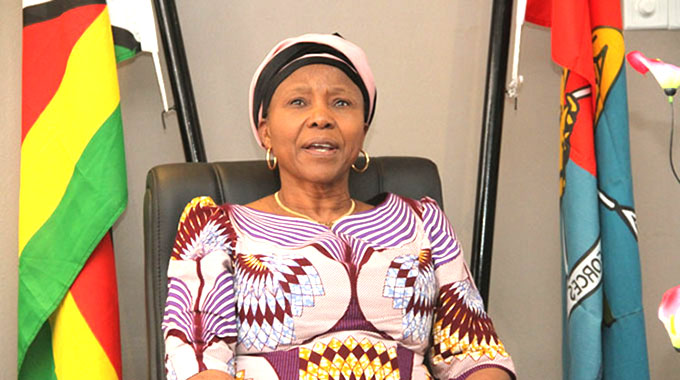Massive water project for Muzarabani

Yeukai Tazira in MUZARABANI
A major water project is being launched in Muzarabani as part of efforts to continue developing rural areas, Defence and War Veterans Affairs Minister, Oppah Muchinguri-Kashiri, said this week when commissioning infrastructure in the area.
A solar-powered piped water supply, a model classroom block and two offices at Chiwenga Primary School, and a waiting mothers’ shelter at Chiwenga Clinic developed by the Zimbabwe Red Cross Society were commissioned in Muzarabani on Wednesday.
Minister Muchinguri-Kashiri said Government had acquired rigs to drill boreholes in Muzarabani, with each village getting one borehole. President Mnangagwa is expected to launch the district drilling programme soon.
“Every village in Zimbabwe is going to get a solar-powered borehole that is 200 metres deep,” said Minister Muchinguri-Kashiri.
Government has already indicated that it intends to drill 35 000 boreholes, one in each of the country’s 35 000 villages.
A further 9 600 boreholes would be drilled at each of the country’s 9 600 schools by 2024, so as to provide clean water and another 36 000 boreholes, two each in each of the 18 000 wards, would be drilled for youth horticulture farms.
The programme feeds into the ongoing efforts to industrialise rural areas since factories and workers’ housing need piped water.
Minister Muchinguri-Kashiri said the Government would build a dam for Muzarabani district as part of the Second Republic’s policy of alleviating drought in marginalised communities.
She applauded the Zimbabwe Red Cross for the infrastructure it developed in Muzarabani. “The three projects were developed by the Zimbabwe Red Cross Society in conjunction with their Finnish Red Cross counterparts in Kabaira and Chiwenga Wards of Muzarabani.”
“The projects, which have positively transformed the local community’s livelihoods, are in sync with the Government’s vision of creating an upper middle income society by 2030.” The Government is now planning to support production of the sesame crop through capacitating farmers and villagers to grow the crop for oil production.
Sesame oil is a highly aromatic oil often used to saute meats and vegetables, and is added to dressings and marinades.
Minister Muchinguri-Kashiri said as part of the Government’s desire to leave no one and no place behind, an extra eight schools would be built in Muzarabani North.
Zimbabwe Red Cross Society president Mr Edson Mlambo said the projects they developed promoted community resilience in the targeted communities, ensuring healthy and safer communities.
“In partnership with Finnish Red Cross, we have been implementing a Community-Based Health and Disaster Management project, which has helped change lives in the district,” he said.
“Notable milestones of our presence here include the footbridge construction for Chadereka, safe learning structures, toilets, and boreholes rehabilitations along with first aid training and awareness-raising campaigns driven by village-based Red Cross volunteers.”
Mr George Tembo of Ward 23 applauded the Zimbabwe Red Cross Society for its unwavering support in improving the community’s quality of life.
“Had it not been for Zimbabwe Red Cross Society and President Mnangagwa’s Government, we would still be drinking unsafe water,” he said. “Cholera and dysentery had been the order of the day before the Kabaira solar-powered piped water scheme.”
Another villager, Mr Nelson Kabaira: “I have been living here for 38 years and I never thought such life changing projects would be implemented here in Muzarabani. Gone are the days when we lost our livestock to crocodiles while they drunk water from rivers.”
Ms Happiness Karodza could not contain her joy and said her children were now getting to school early unlike in the past when they had to first fetch water before going to school.
“Previously, my children would endure the long walk to Musengezi River to fetch water before heading to school,” she said. “One of them escaped death by a whisker when she was attacked by a crocodile while fetching water in the crocodile infested river.”
Another villager, Ms Idah Tichawangana, said her life had been transformed by the new infrastructure.
“I now have a garden at my house where I have planted vegetables to improve my family’s diet,” she said.










Comments